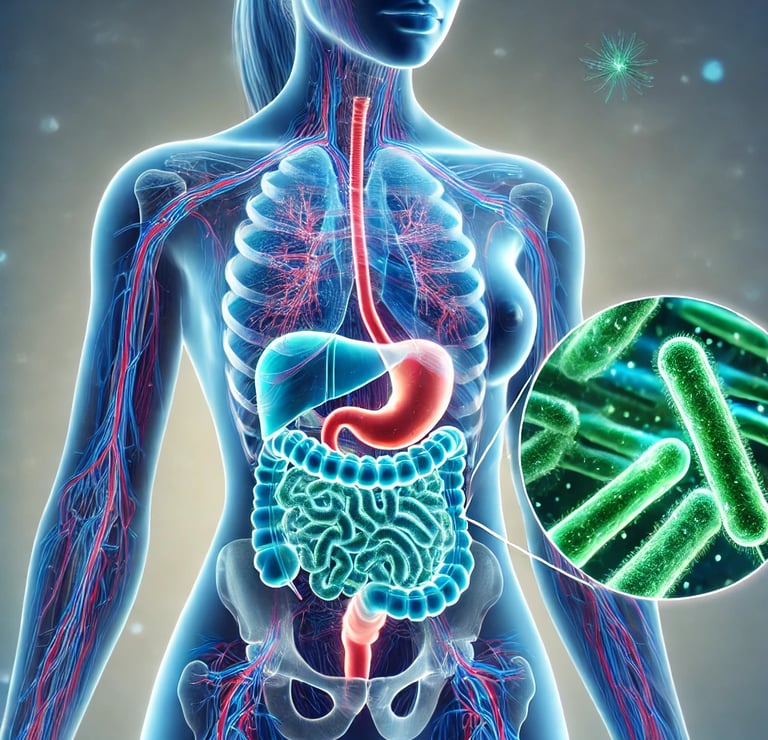Microbiota and menopause: Understanding the connection for better health
Learn how microbiota changes during menopause can impact your health and well-being. Discover how personalized nutrition can help balance your hormones and improve your gut health.
Pablo Navarro Moyano


The transition into menopause brings about significant physiological changes in women, affecting various systems in the body, including the microbiota. Research has increasingly focused on the critical role that the gut and vaginal microbiota play in overall health during menopause, particularly due to the hormonal shifts that occur during this stage. In this article, we will explore the impact of menopause on microbiota, how these changes affect health, and potential dietary and lifestyle interventions to maintain a balanced microbiome during this life transition.
The role of microbiota in women's health
The human body is home to trillions of microbes, many of which are essential for maintaining health. For women, the vaginal microbiota (VMB) and the gut microbiome are particularly important as they are directly influenced by hormones, age, and lifestyle factors. A healthy microbiota supports immune function, hormonal balance, and protects against infections.
In premenopausal women, Lactobacillus species dominate the vaginal microbiota, helping maintain a low vaginal pH that protects against infections. As menopause approaches, estrogen levels decline, and the abundance of Lactobacillusdecreases, leading to an increase in other bacterial species that can cause vaginal infections, discomfort, and even raise the risk for cardiovascular diseases and metabolic disorders.
How menopause affects microbiota
Menopause is associated with significant changes in both the vaginal and gut microbiota. These shifts are largely driven by the reduction in estrogen, which affects microbial diversity and stability.
1. Vaginal microbiota alterations
As estrogen declines during menopause, the vaginal microbiota undergoes a notable transformation. Lactobacillus levels decrease, while anaerobic bacteria such as Gardnerella and Prevotella increase. This shift raises vaginal pH, which can increase the risk of bacterial vaginosis (BV) and other vaginal infections, affecting both physical health and quality of life.
2. Gut microbiota changes
The gut microbiota also experiences significant changes during menopause. Studies have shown that postmenopausal women tend to have lower microbial diversity in the gut compared to premenopausal women, aligning more closely with the gut microbiomes of men. This reduction in diversity can contribute to metabolic disorders such as obesity, insulin resistance, and cardiovascular disease, all of which are more common after menopause.
The estrobolome — a subset of gut bacteria that metabolizes estrogen — is also affected. A decline in estrogen-metabolizing bacteria can lead to hormonal imbalances that exacerbate menopausal symptoms like weight gain, hot flashes, and mood swings.
Health implications of microbiota changes in menopause
The changes in microbiota during menopause are linked to various health risks, including:
Increased susceptibility to infections: With the reduction of protective Lactobacillus in the vaginal microbiota, postmenopausal women may be more prone to urinary tract infections and bacterial vaginosis.
Metabolic and cardiovascular health: The decline in gut microbiome diversity has been associated with an increased risk of metabolic syndrome, which includes conditions like obesity, high blood pressure, and insulin resistance. These conditions heighten the risk of cardiovascular disease, a leading cause of death in postmenopausal women.
Hormonal regulation: The gut microbiota plays a key role in regulating hormones, particularly estrogen. A disrupted microbiota can lead to hormonal imbalances, worsening menopausal symptoms and increasing the risk of osteoporosis and weight gain.
Potential interventions for microbiota health during menopause
Given the critical role of microbiota in maintaining health during menopause, it’s important to adopt strategies that promote microbial balance. Some potential interventions include:
1. Probiotics
Probiotic supplements, especially those containing Lactobacillus species, may help restore balance in the vaginal microbiota, reducing the risk of infections and improving vaginal health. Probiotics can also support gut health by promoting the growth of beneficial bacteria, potentially mitigating some of the metabolic risks associated with menopause.
2. Dietary Interventions
A diet rich in fiber and fermented foods can help support a healthy gut microbiome. Fiber acts as a prebiotic, feeding beneficial bacteria, while fermented foods such as yogurt, kefir, and sauerkraut provide live cultures that can improve gut microbial diversity. Avoiding processed foods and sugars, which can disrupt the microbiota, is also essential.
3. Hormone Therapy
Hormone replacement therapy (HRT) may help alleviate some of the symptoms of menopause, such as vaginal dryness and atrophy, by increasing estrogen levels. Studies have shown that HRT can positively influence the vaginal microbiota by promoting the growth of Lactobacillus species. However, HRT may not be suitable for all women, and its effects on the gut microbiota require further study.
4. Comprehensive Approaches
Maintaining a balanced microbiota during menopause may require a holistic approach that includes lifestyle modifications. Regular physical activity, stress management, and adequate sleep can all support a healthy microbiome. Personalized strategies that take into account individual microbiome compositions and specific menopausal symptoms may offer the best outcomes for long-term health.
Understanding the changes in microbiota during menopause can be the key to improving your health and well-being during this stage of life. Adopting the right nutrition, incorporating probiotics, and maintaining healthy habits can help balance your microbiome and hormones, reducing the risk of various health issues.
If you’re going through menopause and want to learn more about how personalized nutrition can improve your gut health, don’t hesitate to reach out to me! Together, we can create a tailored nutrition plan that helps you feel more balanced and energized. Book your free consultation today and take the first step toward a healthier menopause!
Nutrición adaptada a tu estilo de vida
NvrrNutrition@gmail.com
© 2024. All rights reserved.